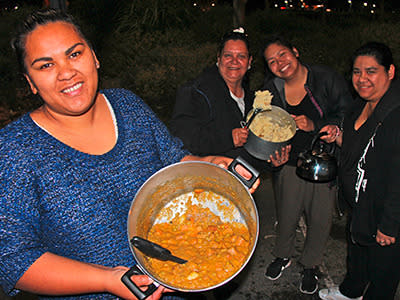Hope, despair on our streets

Rugged up in coats and scarves, Telegraph journalists Elisia Seeber and Hayley Goddard hit the streets to learn first-hand the hardships of those living rough...
Heading out on Wednesday, Thursday and Friday nights, we met people from all walks of life — those experiencing homelessness and those volunteering their time to make people’s lives on the streets a little bit easier.
It was heartbreaking to hear the measures the homeless would take to make ends meet and the circumstances which led to their situation.
Their main concerns included a lack of adequate toilet facilities, hot showers, access to electricity and the constant fear they would be moved on or discovered by rangers.
Stories which hit home included a grandfather who had spent seven years living in a van, constantly worried about his health deteriorating.
A single mother of three was forced to pack what she could into the back of her car and crash in a friend’s lounge room after a rental dispute left her homeless.
A brave woman, known as ‘Butterfly’, sleeps in her car and occasionally sells herself to get by.
In many cases, these people were genuinely proud and refused to be a burden on friends and family, hoping they could one day return to the life they had once led.
Others had adapted to the lifestyle because they had been in the cycle for so long.
The anger and despair these people have at the system and the lack of crisis care and Government housing only made them feel worse.
According to Anglicare WA, less than one per cent of the rentals available in the region are affordable.
It is estimated there are more than 1000 homeless people in the area but, unless they have young children, it can take years to get State housing.
Following the Soul Soup Patrol van on Thursday night highlighted the kindness in the community and the gratitude of those on the streets to volunteers who provided them with a warm meal.
That night, 35 people across Rockingham showed up at different sites for dinner and snacks.
On Friday night, the journalists met the Kiwi Street Angels, a group of women who cook dinner at their own expense to feed those in need.
It was refreshing to see their welcoming smiles and big hearts spurred them to do what they believed was right, understanding first-hand what it was like to live on little money.
For those living rough, it was hard for them to fathom how they would scrub up presentably for a job interview, let alone apply, with deteriorating mental health a major concern for some.
Being on the streets led others to crime and drugs, if not to survive then to shut out the harsh reality of their lives.
Not everyone wanted to share their stories, but those that did will feature in the Telegraph’s ongoing Tough Times campaign.
These factors, combined with the loss of about $40 million in Commonwealth funds towards combating homelessness, only makes these people lose further hope.

